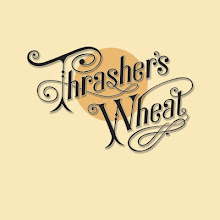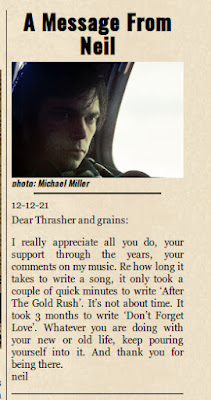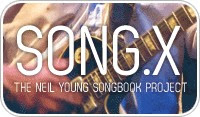Neil Young's "Ditch Quadrilogy" Re-Re-Release is Finally Coming! Official Release Series Discs 5-8 (4CD): May 12 Release
Neil Young's "Ditch Quadrilogy" Re-Re-Release is finally coming!
Back in 2014, Neil Young and Warner Bros. Records announced the release of Young's upcoming Neil Young Official Series 2 Vinyl Box Set, which was intended to come out on Record Store Day, but was delayed due to several other projects that Young had in the works that he wished to focus on. The four long-delayed Neil Young classic vinyl reissues, including the reprint of rare 1973 album Time Fades Away,with On The Beach, Tonight's The Night and Zuma were finally released in September 2016. (Time Fades Away was long exclusive to Young’s Pono service.)
Now, Neil Young's Official Release Series Discs 5-8 (4CD) boxset is scheduled for a May 12 release, per this Amazon Pre-Order Listing.
So after 12+ years or so, the Re-Release "Time Fades Away" Petition may finally be retired with over 150,000 visitors. In the meantime, we'll just to keep referring to Neil Young's elusive "Time Fades Away" album and it's hostage status, as noted in the observation that it's unreleased status is: "Like stashing Mona Lisa in the basement."

"It's like stashing Mona Lisa in the basement."
Petition Signature Signer #6628 by Gareth D.
Hard to believe, but it's been 12+ years since we launched the Release "Time Fades Away" Petition campaign.
Since February 2005, over 150,000 visits have been logged to the TFA page and the petition has gathered over 16,000 verified signatures. (The actual count is closer to 20,000 but the petition site has had several backup failures where thousands of signatures were lost.) Over 16,000 votes have been cast for favorite song on album.

Here's the vote breakdown:
Don't Be Denied - 25.9%
Last Dance - 22.8%
Journey Through the Past - 11.5%
So why does any of this really matter?
Well, for one thing, recent news indicates that there is a possibility that the original TFA may NEVER be re-released at all. From an interview in Guitar World, Young discusses The Archives Vol.#2 which will include Time Fades Away II. TFA#2 is an alternate version from the tour's second half.
"YOUNG: One thing I'll tell you about the next volume of Archives is that Time Fades Away II is in there. And it's interesting because the whole thing has a different drummer than what was on that album. I switched drummers halfway through the tour- Kenny Buttrey was in there for the first half, and Johnny Barbata came in for the second. It's a completely different thing, with completely different songs. So that's interesting. There's lots of stuff like that that I'm working on right now for the second volume."
Again, why does this matter?
It's been called the "missing link" of the "Ditch Trilogy".
Neil Young's 1973 Time Fades Away is one of the most remarkable live albums ever recorded. Certainly at the time of release, it was almost unprecedented for an artist to release a live concert recording of previously unreleased material. Long out of print on vinyl, still unavailable on CD in the early 21st century and widely bootlegged, the album is considered to be the "Holy Grail" of all Neil Young albums.
In an effort to gain wider distribution of this essential Neil Young recording, fans have started a petition requesting that the album be officially released. Those interested in obtaining a legal copy of Time Fades Away are urged to sign the petition today.
In 2003, it seemed that an official release was near when four of the "Missing 6" Neil Young albums surfaced. (On The Beach, one of the four albums released after a long hiatus, was also the subject of a fan's petition drive which would eventually gather over 5,000 signatures from the Neil Young Internet fan community Rust and Human Highway.)
Time Fades Away was recorded directly from the soundboard to 16-track using the Quad-8 CompuMix, the unreliable first digital mixing soundboard—against the wishes of producer David Briggs, who referred to it as the "Compufuck" but was forced to yield to the desires of Young. This resulted in a murky-sounding release. Because no two-track stereo master tape was ever made as would commonly be done, the album cannot be remastered in a traditional manner. If any new release was to be attempted, a new mix would need to be made from the original multitrack tapes.
(Thanks Peter!)
A comment by Greg M (A Friend Of Yours):
I agree with all the reasons stated for releasing and revering the album, but my guess is that there must be something personal beyond what has ever been revealed about that tour and album that causes Neil to short shrift it. Must be something big given it's the only album left unrepresented on Decade- The Bridge at the very least was worthy of being included.
I always thought it was just too painful because of Danny Whitten's 11th hour death preceding the tour. There is also the money disputes that went on, but I think we're grasping at straws, Neil has his reasons is all. The Detroit leg of the tour was the first concert I ever went to, and it was a great experience, especially the first half acoustic set. When the whole band appeared for the electric second half there was a discernible disconnect between band members, no interaction, very removed. It probably didn't help that they partook during intermission- I'm assuming.
The only song that stands out in my mind is Don't Be Denied, and a very lethargic Alabama with Neil playing the Wing guitar. I also think that it is totally in the spirit of Archives to get an alternative version. In the meantime, we can only speculate so much. Hopefully if we ever see TFA II, Neil will fill us in a little more on the details, but only if it's not excruciatingly personal.
Greg M (A Friend Of Yours)
A comment by andrea1bianco:
I've read in some publications that several songs were recorded at the A & M studios by Henry Lewis and during the TFA rehearsals at The Broken Arrow Ranch. Look Out Joe, later released on TTN, comes from these sessions. Some songs, unreleased yet, could have been recorded. I mean Goodbye Christians On The Shore, Come Along And Say You Will, Letter from 'Nam. Nothing officially confirmed, but speculations of some studio recordings during the TFA timeframe exist.
A Rust comment by Jules:
From Decade liner notes:The biography Shakey by Jimmy McDonough quotes a 1987 interview:
"Time Fades Away. No songs from this album are included here. It was recorded on my biggest tour ever, 65 shows in 90 days.
Money hassles among everyone concerned ruined this tour and record for me but I released it anyway so you folks could see what could happen if you lose it for a while.
I was becoming more interested in an audio verite approach than satisfying the public demands for a repetition of Harvest.
My least favorite record is Time Fades Away. I think it's the worst record I ever made—but as a documentary of what was happening to me, it was a great record. I was onstage and I was playing all these songs that nobody had heard before, recording them, and I didn't have the right band. It was just an uncomfortable tour. It was supposed to be this big deal—I just had Harvest out, and they booked me into ninety cities. I felt like a product, and I had this band of all-star musicians that couldn't even look at each other. It was a total joke.

Time Fades Away
Reprise 45 Single - #1184
Courtesy of Side Street Records
We had some really great comments on UNCUT Magazine naming Neil Young's "Time Fades Away" as the #1 Great Lost album of All Time or -- as we like to say -- the "missing link" in the Ditch Trilogy.
Here's another Comment of the Moment on Time Fades Away's impact by Greg M (A Friend Of Yours) responding to Big Chief's comment about whether TFA is significant at all:
Big Chief, you make a couple really good points about the irony of how the success of Harvest paved the way for the unsuccessful releases that fueled Neil’s career about face, releases that otherwise would not have been supported by most record companies (in this respect, we should give credit where credit is due to Reprise and its executives, who really did respect Neil as an artist- there is ample evidence of their willingness to give Neil a long leash, even prior to Harvests’ mega success). I can also understand being underwhelmed by the ditch trilogy (DT), following as it did on the heels of EKTIN/ATG/Harvest. And I have no problem with your just not liking the album.Thanks Greg M!
In general, I know what you mean by “highs and lows”, but for me I never accepted the premise that TFA was a lesser album, that highs can only be appreciated relative to lows, or that the TFA's of the world are something to be stomached because they somehow pave the way for more palatable projects. Don't get me wrong, I've been lambasted before in this forum for admitting that I didn't initially like the DT when it first hit. And I know what you mean about Zuma seeming to be a stellar return to form, that’s how I also saw it on many levels. But by the time Zuma came along, I was over my initial disappointment, even though it took a while, and then many more years before I really appreciated the DT for what it represents to me now. But to the extent that we do, in retrospect, hearken back to the DT, TFA should not be underestimated for the tone it set for what was to come, both in terms of OTB and TTN, as well as for everything that has followed right down to the present.
TFA is a career decision that encapsulates many of the positive attributes we use to define why we hold Neil up to the level of admiration that we do, e.g. uncompromising, stark honesty, raw feeling and emotion accompanied by anti-slick production values- “damn the torpedoes and everything that the public, record company or music press wants, this is what is relevant and worth my effort, because this is what is actually happening in my life”. Like a lot of things we take for granted, we’ve lost our sense of just how revolutionary TFA was, because its spirit became the norm and so familiar to us. No one who really gave the album a chance and listened to it closely, and considered the timing of its release in the aftermath of the success of Harvest, should really be that surprised by anything Neil ever did subsequently. Perhaps that’s the biggest argument yet for the value of re-releasing the album: maybe the FITR/PW/LWW/Greendale bashers of the world would understand anew Neil’s straight ahead approach, and contribution to artistic prerogative. All the more fascinating that Neil does not appear to hold the album in any high regard. Could mediate against many of the things I’m saying. But like Big Chief’s take, it’s my take.
None of this is to say that it isn’t o.k. to not like TFA, or that the point taken doesn’t sometimes trump the music, but in the case of TFA let’s not dismiss the music too prematurely. I can’t recommend a close listen enough. I will put “Journey Through The Past”, “Love In Mind”, and “The Bridge” alongside any heartfelt and emotional song Neil has ever written. These songs and their live performance in particular, stop me in my tracks every time. How about these lyrics?: “Fourteen junkies too weak to work. One sells diamonds for what they're worth. Down on pain street, disappointment lurks… All day presidents look out windows. All night sentries watch the moon glow. All are waiting till the time is right”. “Don’t Be Denied”, “LA”, “Last Dance”- these are kick ass songs. O.K., I admit it, “Yonder Stands The Sinner” does not make my stranded-on-an-island MP3 player, but you know, every rule needs an exception to prove it… My biggest complaint is that the album is just too damn short.
Anyways, just some more thoughts about TFA. Interesting, the more I read these comments, and the more I think about TFA, the more it all comes back to me. The more I’m transported back to the ninth grade, the more I remember how much this album meant to me. But then I remember the time a friend threatened to hit me if I sang “I will stay with you if you’ll stay with me, said the fiddler to the drum” one more time. Time to stop talking before I start repeating myself …
Greg M (A Friend Of Yours)
More on the "missing link" in the Ditch Trilogy.
So if you haven't done so already, go and sign the petition!
And if you have signed, then please re-tweet, share, forward, etc.
More on the history and background of Release "Time Fades Away" Petition.

Hell Freezes Over on May 12, 2017?
Labels: albums, boxset, neil young, time fades away









































 Human Highway
Human Highway

















 Concert Review of the Moment
Concert Review of the Moment





 This Land is My Land
This Land is My Land

 FREEDOM In A New Year
FREEDOM In A New Year









 *Thanks Neil!*
*Thanks Neil!*




![[EFC Blue Ribbon - Free Speech Online]](http://www.thrasherswheat.org/gifs/free-speech.gif)











 The Unbearable Lightness of Being Neil Young
The Unbearable Lightness of Being Neil Young Pardon My Heart
Pardon My Heart



 "We're The Ones
"We're The Ones  Thanks for Supporting Thrasher's Wheat!
Thanks for Supporting Thrasher's Wheat!




 This blog
This blog 
 (... he didn't kill himself either...)
#AaronDidntKillHimself
(... he didn't kill himself either...)
#AaronDidntKillHimself









































































 Neil Young's Moon Songs
Neil Young's Moon Songs




 Civic Duty Is Not Terrorism
Civic Duty Is Not Terrorism Orwell (and Grandpa) Was Right
Orwell (and Grandpa) Was Right


 What's So Funny About
What's So Funny About 


